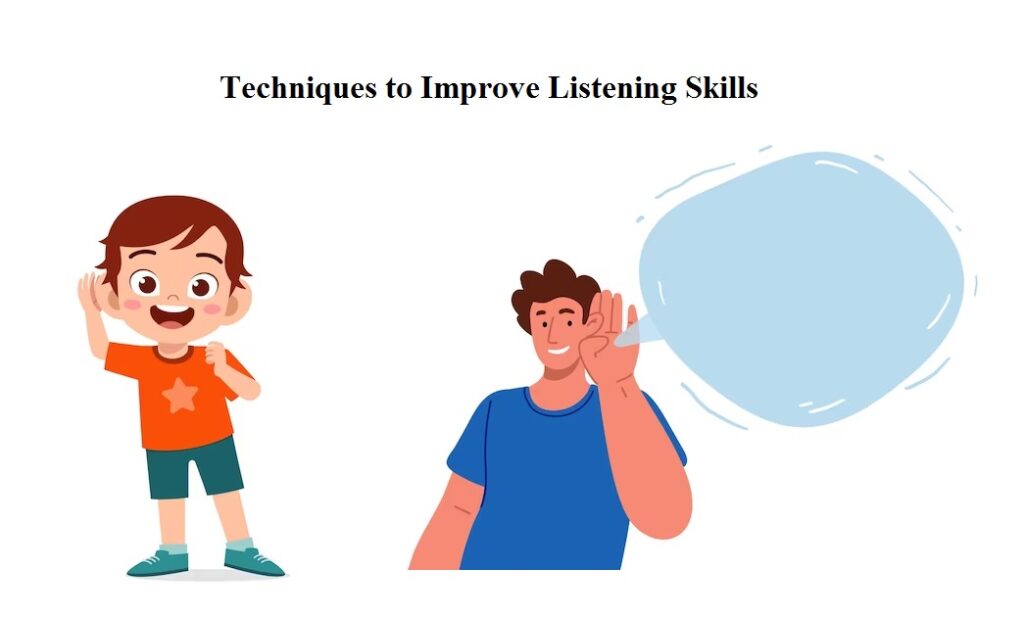
Listening is a purposeful and focused activity. It requires attention and also concentration from the listener. It is a conscious and voluntary activity. Let’s see How to Improve the Listening Skills with best proven activities & Techniques to Improve Listening Skills
How to Improve the Listening Skills in English ?
Essentials of Active Listening
- Intensity
- Empathy
- Acceptance
- Recognizing responsibility for completeness
Activities for improving listening Skills
1. Make Eye Contact:
Lack of eye contact may be interpreted as disinterest or disapproval. Making eye contact with the speaker focuses attention, reduces the chance of distraction, and is encouraging to the speaker.
2. Exhibit Affirmative Nods and Appropriate Facial Expressions:
The effective listener shows signs of being interested in what is said through nonverbal signs. Together with good eye contact, non-verbal expressions convey active listening.
3. Avoid Distracting Actions or Gestures:
Do not look at other people, play with pens or pencils, shuffle papers, or the like. These activities make the speaker feel like the listener is not interested in what is being said.
4. Ask Questions:
Questioning helps ensure clarification of what the speaker is saying, facilitates understanding, and also lets the speaker know that the listener is engaged.
5. Paraphrase:
Paraphrasing means restating what the individual has said in different words. This technique allows the listener to verify that the message was received correctly.
6. Avoid Interrupting the Speaker:
Allow the speaker to complete his or her thought before responding, and do not anticipate what he/she will say.
7. Do Not Talk Too Much:
Talking is easier than listening intently to someone else. An active listener recognizes that it is impossible to talk and listen acutely at the same time.
Techniques to Improve Listening Skills

Here are ten steps of listening process to help you develop effective listening skills:
Step 1: Face the speaker and maintain eye contact.
Talking to someone while they scan the room, study a computer screen, or gaze out the window is like trying to hit a moving target. do your conversational partner the courtesy of turning to face them. Look at them, even if they don’t look at you. Shyness, uncertainty, shame, guilt, or other emotions, along with cultural taboos, can inhibit eye contact in some people under some circumstances. Excuse the other person, but stay focused yourself.
Step 2: Be attentive, but relaxed.
Now that you’ve made eye contact, relax. You don’t have to stare fixedly at the other person. You can look away now and then and carry on like a normal person. The important thing is to be attentive. You can be attentive by being present, giving attention, applying or directing yourself, and remaining ready to serve. Mentally screen out distraction, like background activity and noise. Finally, don’t be distracted by your own thoughts, feelings, or biases.
Step 3: Keep an open mind.
Listen without judging the other person or mentally criticizing the things she tells you. If what someone says alarms you, go ahead and feel alarmed. As soon as you indulge in judgemental bemusements, you’ve compromised your effectiveness as a listener. Listen without jumping to conclusion. Don’t be a sentence-grabber.
Step 4: Listen to the words and try to picture what the speaker is sating.
Allow your mind to create a mental model of the information being communicated. Whether a literal picture, or an arrangement of abstract concepts, your brain will do necessary work if you stay focused with senses fully alert. When listening to long stretches, concentrate on, and remember, key words and phrases.
Step 5: Don’t interrupt and don’t impose your ‘solution’.
Since our childhood, we have been trained in a way not to interrupt. It is considered to be rude.
Step 6: Wait for the speaker to pause to ask clarifying questions.
When you don’t understand something, of course you should ask the speaker to explain it to you. But, rather than interrupt, wait until the speaker pauses.
Step 7: Ask questions only to ensure understanding
A conversational affront happens all the time. Our questions lead people in directions that have nothing to do with where they thought they were going. Sometimes we work our way back to the original topic, but very often we don’t. when you notice that your question has led the speaker astray, take responsibility for getting the conversation back on track.
Step 8: Try to feel what the speaker is feeling.
Empathy is the heart and soul of good listening. To experience empathy, you have to put yourself in the person’s place and allow yourself to feel what it is like to be that person at that moment. This is not an easy thing to do. It takes energy and concentration. But, it is generous and helpful thing to do, and it facilitates communication like nothing else does.
Step 9: Give the speaker regular feedback.
Show that you understand where the speaker is coming from by reflecting the speaker’s feelings. If the speaker’s feelings are hidden or unclear, then occasionally paraphrase the content of the message, or just nod and show your understanding through appropriate facial expression. The idea is to give the speaker some proof that you are listening, and that you are following speaker’s train of thought. In task situations, regardless of whether at work or home, always restate instructions and messages to be sure you understand correctly.
Step 10: Pay attention to what isn’t said to nonverbal cues.
If you exclude e-mail, the majority of direct communication is probably nonverbal. We glean a great deal of information about each other without saying a word. Even over the telephone, you can learn almost as much about a person from the tome and cadence of the speaker’s voice than from anything s/he says. While listening, remember that words convey only a fraction of the message.
LIKE WHAT YOU’RE READING?
CHECK OUT SOME OF OUR OTHER GREAT CONTENT HERE
- THE ART OF PUBLIC SPEAKING (STEP BY STEP GUIDE)
- HOW TO IMPROVE COMMUNICATION SKILLS?
- PROFESSIONAL & BUSINESS COMMUNICATION
- 7 EFFECTIVE PRINCIPLES OF COMMUNICATION
- 6 Effective Elements of the Communication
- WHAT ARE THE OBJECTIVES OF COMMUNICATION?
- 7 NON VERBAL MEANS OF COMMUNICATION
- 12 BEST TIPS TO OVERCOME BARRIERS FOR EFFECTIVE COMMUNICATION
- 5 BEST ENGLISH BOOKS FOR GRAMMAR
- WHAT ARE THE INTERPERSONAL SKILLS ? 6 TIPS TO DEVELOP IT!




2 Comments